
Naharaim
Scope & Guideline
Unveiling Historical Narratives of the Near East
Introduction
Aims and Scopes
- Jewish Cultural Studies:
The journal explores various aspects of Jewish culture, including literature, art, and photography, reflecting on how these elements contribute to the formation of Jewish identity and public discourse. - Historical and Literary Analysis:
Naharaim publishes papers that analyze historical texts and literary works, examining their significance within Jewish intellectual traditions and their impact on contemporary issues. - Interdisciplinary Approaches:
The journal encourages interdisciplinary research that combines insights from sociology, philosophy, and cultural studies to address complex themes within Jewish studies. - Translation and Adaptation:
A unique contribution of the journal is its focus on translation as a collaborative process, investigating how cultural works are adapted and transformed across different languages and contexts. - Political Theology and Ethics:
The journal engages with themes of political theology, particularly in the context of Jewish thought, exploring ethical dimensions within historical and contemporary frameworks.
Trending and Emerging
- Jewish Identity in Modern Contexts:
A growing emphasis on contemporary Jewish identity, particularly as it relates to modernity, secularism, and cultural adaptation, is evident in recent publications, reflecting current societal debates. - Intersections of Literature and Politics:
There is an increasing trend of exploring the intersections between literature and political thought, with scholars examining how literary texts inform or critique political ideologies within Jewish contexts. - Transnational and Diasporic Studies:
Emerging themes focusing on transnational Jewish experiences and diasporic identities are gaining traction, suggesting a shift towards understanding Jewish culture beyond national boundaries. - Gender and Jewish Studies:
The exploration of gender in relation to Jewish identity and cultural production is becoming more prominent, reflecting broader academic trends that prioritize intersectionality and diverse perspectives. - Visual Culture and Jewish Representation:
There is a notable increase in research concerning visual culture, particularly photography and its role in shaping Jewish narratives, indicating a broader interest in how visual media contributes to cultural identity.
Declining or Waning
- Traditional Jewish Philosophy:
Papers focusing solely on classical Jewish philosophy, such as those centered around figures like Maimonides or medieval Jewish thought, have become less prominent, indicating a shift towards contemporary relevance and practical implications. - Historical Narratives of Jewish Suffering:
While historical narratives, particularly those addressing the Holocaust, remain significant, there is a noticeable decline in papers that approach these topics from a purely historical perspective, favoring more nuanced cultural and literary analyses. - Studies on Eastern European Jewish Identity:
Research specifically centered on Eastern European Jewish identity and its historical contexts appears to be diminishing, possibly due to a broader focus on global Jewish experiences and multicultural perspectives.
Similar Journals
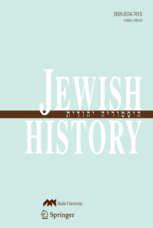
Jewish History
Preserving the Legacy: A Scholarly Journey into Jewish NarrativesJewish History is a significant academic journal published by Springer, focusing on the multifaceted historical narratives of Jewish communities worldwide. With roots tracing back to 1986, this esteemed journal offers an intellectual platform where researchers and scholars can engage critically with the vast and rich tapestry of Jewish heritage, culture, and experiences. Although it operates under a traditional subscription model, the journal has gained a notable standing in recent years, achieving a Q4 ranking in Cultural Studies and a Q3 ranking in History for 2023, reflecting its robust scholarly contributions. The journal is indexed in Scopus, with a rank of #808 in Arts and Humanities History and #754 in Social Sciences Cultural Studies, placing it within the competitive landscape of academic publishing. Its commitment to advancing the field of Jewish studies makes it an essential resource for researchers, professionals, and students alike, who seek to deepen their understanding of Jewish history from historical, cultural, and social perspectives.
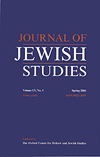
JOURNAL OF JEWISH STUDIES
Advancing Scholarship in Jewish StudiesJOURNAL OF JEWISH STUDIES, published by the Oxford Centre for Hebrew and Jewish Studies, stands as a distinguished platform for scholarly discourse in the fields of Jewish history, culture, literature, and religious studies. With its ISSN 0022-2097, this journal is recognized for its significant contributions to understanding Jewish heritage and thought, achieving commendable rankings in various categories, including Q1 in Literature and Literary Theory and Q2 in History and Cultural Studies, as of 2023. The journal fosters rigorous academic engagement and encourages researchers and scholars worldwide to explore the complexities of Jewish identity and its interconnections with broader historical narratives. Operating without an open access model, it nonetheless ensures a wide reach through its well-regarded reputation, making it an essential resource for anyone invested in Jewish studies. With a publication history spanning from 2002 to 2024, the journal continues to serve as an invaluable repository of knowledge and insight for students, researchers, and professionals alike.

Kwartalnik Historii Zydow-Jewish History Quarterly
Celebrating the Depth and Diversity of Jewish ExperiencesKwartalnik Historii Żydów - Jewish History Quarterly is a dedicated academic journal published by the esteemed Jewish Historical Institute in Warsaw, Poland. With an ISSN of 1899-3044, this quarterly publication serves as a vital platform for scholarly discourse on Jewish history, culture, and heritage. The journal aims to reflect the diversity and complexity of Jewish experiences across historical contexts, making it an essential resource for researchers, professionals, and students in the fields of History, Religious Studies, and Cultural Studies. Despite its recent coverage discontinuation in Scopus from 2012 to 2015, the journal's rankings within its respective categories indicate a modestly engaged readership and potential for contribution, particularly seen in its ranks of 339/388 in Religious Studies and 859/975 in History. Although the journal operates on a non-open access basis, its curated articles enrich the understanding of Jewish narratives and interactions within broader socio-cultural frameworks, underlining its importance in promoting historical knowledge and cultural appreciation.

Journal of Hebrew Scriptures
Illuminating the Significance of Hebrew ScripturesThe Journal of Hebrew Scriptures is a leading open-access academic journal, published by University of Alberta, that has been at the forefront of biblical scholarship and Jewish studies since its inception in 1997. This journal presents an extensive collection of scholarly articles, critical analyses, and discussions that focus on the interpretation and significance of Hebrew Scriptures, making it an essential resource for researchers, educators, and students alike. The journal's commitment to open access ensures that it reaches a wide audience, promoting greater visibility and collaboration within the field. With its dedication to advancing the study of biblical texts, the Journal of Hebrew Scriptures plays a pivotal role in fostering academic discourse and disseminating innovative research to the global scholarly community. As an invaluable platform for the exploration of theological, historical, and cultural aspects of Hebrew Scriptures, it invites submissions that can enrich the understanding and appreciation of these ancient texts.

Quest-Issues in Contemporary Jewish History
Illuminating the Past, Shaping the Future of Jewish StudiesQuest - Issues in Contemporary Jewish History is a pivotal open-access journal published by the Fondazione Centro Documentazione Ebraica Contemporanea in Italy. Since its inception in 2010, this journal has been dedicated to the scholarly exploration of the multifaceted dimensions of contemporary Jewish history, making significant contributions to the fields of history and cultural studies. With an ISSN of 2037-741X, it serves as a vital platform for researchers, professionals, and students alike, providing access to an array of insightful articles and research findings. As of 2023, it holds a respectable Q3 ranking in the History category within Scopus, indicating its growing influence in academia, alongside a rank of #899 out of 1760 in Arts and Humanities – History. This makes it an essential resource for those looking to deepen their understanding of Jewish history in a contemporary context. The journal, with its rich scholarly outputs converging from 2017 to 2023, is based in Milan and strives to foster high-quality research in Jewish studies.
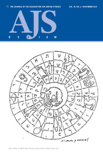
AJS Review-The Journal of the Association for Jewish Studies
Connecting Disciplines to Enrich Jewish Academic DiscourseAJS Review - The Journal of the Association for Jewish Studies is a leading academic journal published by the University of Pennsylvania Press, dedicated to advancing scholarship in Jewish studies. With its ISSN 0364-0094 and E-ISSN 1475-4541, the journal offers a rich compendium of research from various disciplines, including cultural studies, history, literature and literary theory, and religious studies. Recognized within the Q2 and Q3 quartiles across multiple categories in 2023, AJS Review provides an esteemed platform for academics to disseminate innovative ideas and engage with critical issues relevant to Jewish history and culture from 1976 to 2024. Although not an open-access journal, it ensures that high-quality, peer-reviewed articles are available to a global audience, enabling researchers, professionals, and students to foster deeper insights into Jewish narratives and heritage. By promoting interdisciplinary dialogue, AJS Review is integral to the academic community, offering valuable contributions to our understanding of Jewish studies and its broader implications.
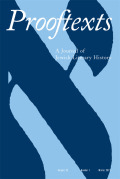
PROOFTEXTS-A JOURNAL OF JEWISH LITERARY HISTORY
Fostering Dialogue on Jewish Literary EvolutionPROOFTEXTS: A Journal of Jewish Literary History, published by Indiana University Press, is a premier academic journal dedicated to the exploration and critical analysis of Jewish literature and its historical contexts. With an ISSN of 0272-9601 and an E-ISSN of 1086-3311, this journal not only serves as a platform for innovative scholarship but also aims to foster dialogue among scholars in the fields of Cultural Studies, Literature and Literary Theory, and Religious Studies. As evidenced by its 2023 Scopus ranking—place within the third quartile in Cultural Studies and Religious Studies, and second quartile in Literature and Literary Theory—PROOFTEXTS stands out as a significant contributor to academic literature, attracting a diverse readership of researchers, professionals, and students alike. The journal’s commitment to open access is limited, thus ensuring a selective dissemination of high-quality research materials. Researchers are encouraged to contribute their insights and engage with the intricate narratives that shape Jewish literary heritage from 2002 to its convergence during select years, highlighting the ongoing evolution and relevance of this vibrant field. For in-depth understanding of Jewish literary history, PROOFTEXTS remains an indispensable resource.
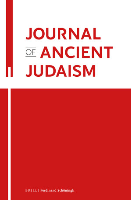
Journal of Ancient Judaism
Illuminating the Cultural Contexts of Ancient JudaismThe Journal of Ancient Judaism is an esteemed academic publication focusing on the dynamic field of religious studies, particularly the historical and cultural contexts of ancient Judaism. Published by BRILL, a reputable international publisher known for its scholarly contributions, this journal is dedicated to advancing the study of ancient Jewish texts, traditions, and their socio-political environments. With an ISSN of 1869-3296 and an E-ISSN of 2196-7954, the journal has established its footprint in the scholarly community, supported by its ranking in the Q3 quartile for Religious Studies in 2023 and a Scopus rank of #371 out of 644 in its category. The content showcased in this journal is vital for researchers, professionals, and students alike, offering peer-reviewed articles that contribute to the broader understanding and appreciation of ancient Jewish heritage and its influence on contemporary religious thought. With a timeline spanning from 2015 to 2024, the journal aims to facilitate rigorous academic discourse and provide open access to vital research findings, fostering a deeper engagement with the complexities of ancient Judaism.

Jewish Studies Quarterly
Illuminating the Rich Tapestry of Jewish StudiesJewish Studies Quarterly, published by MOHR SIEBECK, is a leading academic journal dedicated to advancing scholarship in the field of Jewish studies. With its ISSN 0944-5706 and E-ISSN 1868-6788, this journal provides a platform for rigorous research that explores various dimensions of Jewish history, culture, religious practices, and contemporary issues. Although it does not currently offer open access options, it remains an essential resource for researchers, professionals, and students seeking insightful analysis and academic discourse. The journal is widely recognized for its commitment to excellence and contribution to understanding Jewish identities within global contexts. Located in Tübingen, Germany, Jewish Studies Quarterly is integral to the dialogue and scholarship surrounding Jewish thought and heritage, making it a vital reference point in the academic community.

Arquivo Maaravi-Revista Digital de Estudos Judaicos da UFMG
A Platform for Critical Jewish DiscourseArquivo Maaravi-Revista Digital de Estudos Judaicos da UFMG is a distinguished open-access journal dedicated to the field of Jewish Studies, published by the Universidade Federal de Minas Gerais (UFMG). With an ISSN of 1982-3053, the journal has been serving the academic community since 2007, facilitating the dissemination of research and scholarship in Jewish cultural, historical, and religious studies. Situated in the vibrant academic landscape of Brazil, the journal aims to foster dialogue among researchers, professionals, and students, providing a platform for innovative and critical perspectives. Although the H-Index and specific Scopus ranks are not available, the journal's commitment to academic rigor and open access ensures that its content reaches a broad audience, empowering researchers and enriching the field of Jewish studies worldwide. The journal is based at FAC Ciências Econômicas, Av. Antonio Carlos, 6627, Belo Horizonte MG 31270-901, Brazil, making it an integral part of the UFMG's academic ecosystem.